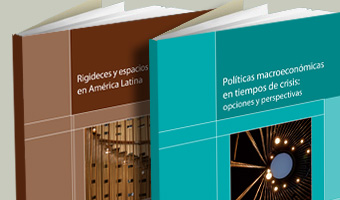After Crisis, Governments Should Safeguard Fiscal Sustainability

Now that the effects of the international crisis in Latin America and the Caribbean seem to be gradually retreating, it is time to analyse whether the measures adopted to address them should be maintained or relaxed. And above all, efforts should be made to ensure the fiscal sustainability of the economy.
“The first concern was to implement countercyclical and compensatory policies, but now the need arises to protect fiscal sustainability and review the numbers of the public debt,” stated Osvaldo Kacef and Juan Pablo Jiménez, Director and Officer of Economic Affairs at ECLAC’s Economic Development Division, respectively.
The experts warn that 2009 will be a year of deficit and governments should begin thinking of what is to come in 2010, particularly in terms of macroeconomic and fiscal policies.
"The second semester is going to be good and next year the region will grow at a higher rate than expected last August (3.1%). We should start changing the estimates, and therefore, public policies cannot remain the same. The need to apply urgent measures to address the crisis is not the same,” stressed Kacef.
Analysing public policies to address the crisis has been a central focus of ECLAC activities during 2009. The Commission’s Economic Development Division organised three high-level seminars (in Montevideo, San Salvador, Santiago) in which authorities and experts from several countries examined the role of public policies and their relationship with macroeconomic policies and legislature.
The lessons learned from these meetings were valuable and will serve as input for future activities and publications on the relationship between macroeconomy, taxation and equality, and the distributive impact of public policies.
Kacef and Jiménez asserted that one of the main challenges countries in the region will face in the future is to create coordination policies between the Executive and Legislative powers and Central Banks so that policy responses are more effective.
Also relevant are the means of coordination within different government structures, especially in decentralized countries such as Argentina, Bolivia, Brazil, Colombia and Mexico, in order to avoid possible conflicts over the distribution of transfers to provinces, states or municipalities.
“The impact of the crisis in these countries has been very significant and often the deficiencies in coordination have compounded the effects instead of mitigating them,” they said.
Another key issue discussed in these seminars has been the role of the State. ECLAC has stressed the need to strengthen the State, providing it with greater capabilities and resources to implement policies.
This is what is called the “fiscal margin” or “policy margin” with regard to the instruments of fiscal policy available to address difficulties.
“For example, it’s not the same a country with debt capacity than one without; or countries that can use exchange policies and those that can’t,” they said.
Another issue is the role that international bodies, especially the International Monetary Fund (IMF), should play as a provider of financial aid to implement reactivation policies.
“The crisis gave us the opportunity to put to test some of the things we had previously stated and reassert our ideas. We said, for example, that the region was on better ground, was more resistant to the crisis, and that countries that haven’t applied countercyclical policies will have more difficulties in recovery than those that have used the boom to generate savings and instruments that allow them to face the turbulence. That has effectively happened,” said Jiménez.
As technical secretary of the Costa do Sauípe Summit (Brazil), which gathered heads of State in the region in December 2008, ECLAC is actively cooperating with member countries to establish an observatory of policies implemented in the region to address the crisis and analyse the relationship between the IMF and countries in the region.
In addition, it is preparing material for the next Latin America-European Union Forum to be held next year in Madrid.
For more information, see: www.cepal.org/en/work-areas/economic-development
Related publications:
•
Macroeconomic policies in times of crisis: options and
perspectives, Osvaldo Kacef and Juan Pablo Jiménez (compilers). August 2009
•
Rigideces y espacios fiscales en América Latina
(in Spanish), Oscar Cetrángolo and Juan Pablo Jiménez, (compilers).
September 2009











